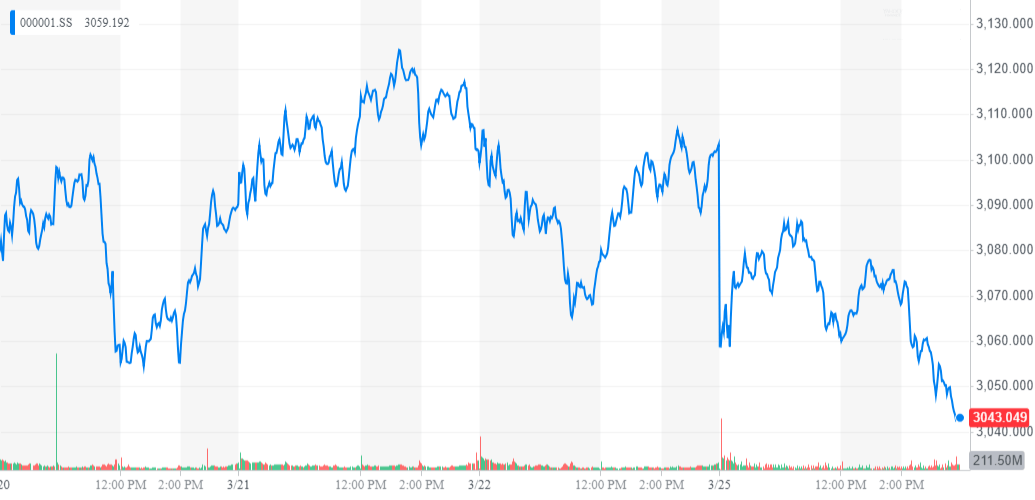US President Donald Trump might have expected a massive stock market bounce following the bombshell revelation that Special Counsel Robert Mueller’s 675-day-long investigation into the Trump campaign had failed to expose any evidence of collusion with the Russian government. However, Dow futures are flat ahead of Monday’s opening bell following a bloodbath in the Asian markets.
Dow Flounders in First Trading Session Since Massive Friday Sell-Off
Just before the opening bell, the Dow Jones Industrial Average stood ready to mount a minor advance, with futures dropping 34 points but implying a gain of 9.68 points. The S&P 500 held steady in the minutes prior to the open, while the Nasdaq implied a loss 0f 7.31 points.


Dow futures implied a minor gain at the open, but the index failed to recover from Friday’s major sell-off. | Source: Yahoo Finance
On Friday, the Dow plunged 460.19 points, shedding 1.77 percent after closing at 25,502.32. Remarkably, that dreadful showing still saw it outperform its sister indices, as the S&P 500 cratered by 54.17 points or 1.9 percent to fall back to 2,800.71 and the Nasdaq plummeted by 196.29 points or 2.5 percent to end the week at 7,642.67.
Mueller Report Emboldens Donald Trump


Robert Mueller’s investigation into the 2016 Trump campaign is complete, and it appears to vindicate the president. | Source: White House/Wikimedia Commons
This morning, Wall Street is digesting several major developments, the most notable of which is that US Special Counsel Robert Mueller delivered the formal report on his nearly two-year investigation into the 2016 presidential election to Congress, and – much to the chagrin of Trump critics – it appears to have vindicated the president.
While Mueller’s official report remains sealed, US Attorney General William Barr sent Congress a summary letter, which has since been made public. According to Barr, the investigation’s 500 search warrants and 2,800 subpoenas had failed to establish that Trump or anyone associated with his campaign had illegally participated in the Russian government’s attempts to influence the 2016 election.
No Collusion, No Obstruction, Complete and Total EXONERATION. KEEP AMERICA GREAT!
— Donald J. Trump (@realDonaldTrump) March 24, 2019
True to form, Trump took a victory lap on Twitter, gloating that the investigation Democrats had hoped would be his undoing – and that he had derided as a “witch hunt” – had failed to find any evidence that:
“the Trump campaign, or anyone associated with it, conspired or coordinated with the Russian government…despite multiple offers from Russian-affiliated individuals to assist the Trump campaign.”
Dow Struggles as Foreign Investors Dump China Stocks
Monday should have been a triumphant day for Donald Trump, who evaluates the success of his administration based on the Dow’s performance. Mueller’s findings virtually assure that Democrats will cower away from dragging him through a prolonged impeachment fight, and the report should also bolster his reelection chances.
Both of those factors should have juiced the Dow following last Friday’s bloodbath, particularly given the anti-market sentiment that pervades the current crop of Democratic presidential frontrunners. However, the Asian trading session took the wind out of any potential recovery’s sails.
The MSCI Asia Pacific Index fell 2 percent – its worst loss of 2019 – and the Shanghai Composite Index (SSE) fell 1.97 percent to 3,043.03.
According to Bloomberg, foreign investors dumped a record number of Chinese shares on Monday, liquidating a net $1.6 billion following a meteoric surge in China stocks over the first three months of 2019.


Foreign investors sold $1.6 billion worth of Chinese shares on Monday, the largest such sell-off on record. | Source: Bloomberg
“Investors tend to be more risk-averse after recent data showed signs of economic slowdowns in major economies,” said Ben Kwong, a Hong Kong-based executive director with KGI Asia Ltd. “They’d sell high-risk assets such as Chinese equities. Some investors would lock in profits after such a big rally to avoid uncertainties.”
Monday’s Asia sell-off will only add to fears of a global slowdown, concerns which have rapidly begun to mount over the past month. Until now, the red-hot US economy has mostly remained immune. However, few economists expect that state of play to hold throughout the coming months.
With Trump planning to center his 2020 reelection campaign on the stock market’s breathtaking run over the course of his first term, how will his administration respond if the economy turns frigid on the eve of next year’s election fight?


